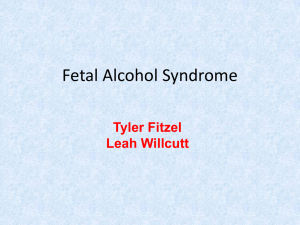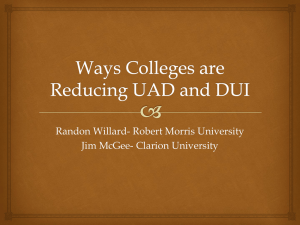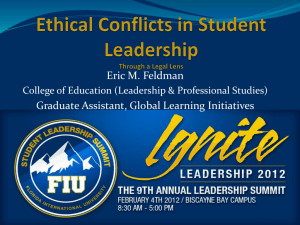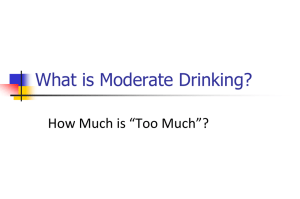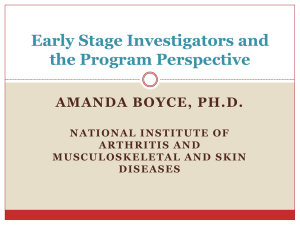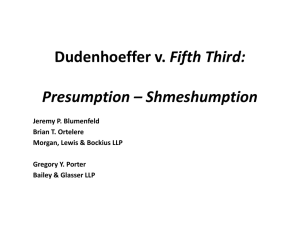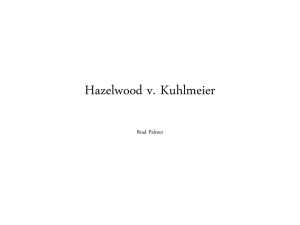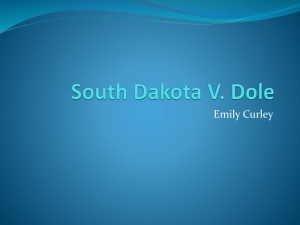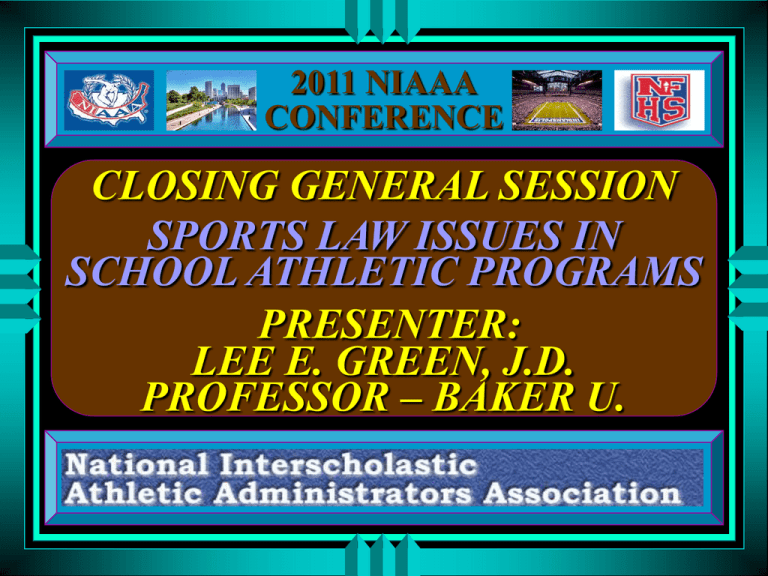
2011 NIAAA
CONFERENCE
CLOSING GENERAL SESSION
SPORTS LAW ISSUES IN
SCHOOL ATHLETIC PROGRAMS
PRESENTER:
LEE E. GREEN, J.D.
PROFESSOR – BAKER U.
2011 NIAAA
CONFERENCE
FIRST AMENDMENT
FREE SPEECH RIGHTS &
STUDENT-ATHLETE USE
OF SOCIAL MEDIA WEBSITES
2011 NIAAA
CONFERENCE
A soccer player, on her home
computer, creates a Facebook
page intended to parody her
coach and her high school
athletic director.
2011 NIAAA
CONFERENCE
The page includes a petition that
visitors may sign to encourage
that the coach be fired both for
incompetence and because of
alleged inappropriate contact
with players (a falsehood).
2011 NIAAA
CONFERENCE
The page includes a Top Ten list
characterizing the AD as a sex
addict and pedophile with a
prison record (all falsehoods).
2011 NIAAA
CONFERENCE
The page is filled with profane
language and photoshopped
lewd images of the coach and
AD in various states of undress.
2011 NIAAA
CONFERENCE
The page also includes numerous
disparaging falsehoods and
altered images designed to bully
other soccer players and students.
2011 NIAAA
CONFERENCE
Upon seeing the coach and AD at
a restaurant, both still unaware
of her Facebook page, the player
returns their friendly waves with
an extension of her middle finger
and an expletive heard by both.
2011 NIAAA
CONFERENCE
The History Of Student Free Speech
Tinker V. Des Moines School District
U.S. Supreme Court – 1969
Ruling By The Supreme Court:
Students do not shed their constitutional rights at the schoolhouse gate.
Schools may limit student speech
only where it would materially and
substantially interfere with the work
and discipline of the school.
2011 NIAAA
CONFERENCE
The History Of Student Free Speech
Bethel School District v. Frasier
U.S. Supreme Court – 1986
Ruling By The Supreme Court:
Schools may prohibit on-campus
student speech that is vulgar, lewd, or
indecent because such discourse is
inconsistent with the fundamental
values of public school education.
2011 NIAAA
CONFERENCE
The History Of Student Free Speech
Hazelwood School Dist. v. Kuhlmeier
U.S. Supreme Court – 1988
Ruling By The Supreme Court:
Schools may regulate student speech in
school-sponsored activities that are
part of the curriculum (e.g. a school
newspaper) so long as their actions are
reasonably related to legitimate
pedagogical concerns.
2011 NIAAA
CONFERENCE
The History Of Student Free Speech
Morse v. Frederick
U.S. Supreme Court – 2007
Ruling By The Supreme Court:
Schools may regulate student speech
that takes place in school or at a school
event which advocates the violation of
an explicit school policy such as that
prohibiting the use by students of
illegal drugs.
2011 NIAAA
CONFERENCE
Student Free Speech Cases - 2011
Doninger v. Niehoff
U.S. Second Circuit – April 25, 2011
Ruling By The Appellate Court:
No free speech violation because the
student’s conduct “posed a reasonably
foreseeable risk that it would come to
the attention of school authorities and
materially and substantially disrupt
the work and discipline of the school.”
2011 NIAAA
CONFERENCE
Student Free Speech Cases - 2011
J.S. v. Blue Mountain School District
U.S. Third Circuit – June 13, 2011
Ruling By The Appellate Court:
Free speech violation because student’s
conduct did not cause a Tinker substantial disruption in school and because
Bethel standard regarding lewd speech
does not apply to off-campus speech.
2011 NIAAA
CONFERENCE
Student Free Speech Cases - 2011
Layschock v. Hermitage School Dt.
U.S. Third Circuit – June 13, 2011
Ruling By The Appellate Court:
Free speech violation; no substantial
disruption in school; “we do not think
that the First Amendment can tolerate
the district stretching its authority into
[the student’s] grandmother’s home
and reaching him while he is sitting
at her computer.”
2011 NIAAA
CONFERENCE
Student Free Speech Cases - 2011
Kowalski v. Berkeley County Schools
U.S. Fourth Circuit – July 27, 2011
Ruling By The Appellate Court:
No free speech violation; bullying and
harassment create a substantial disruption; although the speech originated
off-campus, the student knew her
words would reach the school and
impact the school environment.
2011 NIAAA
CONFERENCE
Student Free Speech Cases - 2011
D.J.M. V. Hannibal Public School Dt.
U.S. Eighth Circuit – August 1, 2011
Ruling By The Appellate Court:
No free speech violation because the
student’s conduct constituted a “true
threat” - “a statement that a reasonable
recipient would have interpreted as a
serious expression of intent to cause
harm or injury to another.”
2011 NIAAA
CONFERENCE
Student Free Speech Cases - 2011
T.V.&M.K v. Smith-Green C. Schools
U.S. District Court (IN) - Aug 10, 2011
Ruling By The District Court:
Free speech violation; no substantial
disruption in school; student-athlete
code of conduct was too vague; social
media policies must be highly specific
and narrowly tailored with regard to
defining prohibited behaviors.
2011 NIAAA
CONFERENCE
Other Student Free Speech Cases
Lowery v. Euvard
U.S. Sixth Circuit – 2007
Ruling By The Appellate Court:
Upheld the suspension from their team
of high school football players who
were actively campaigning (petitions)
to have their coach fired; court applied
the Tinker substantial disruption
standard to team morale/discipline.
2011 NIAAA
CONFERENCE
Other Student Free Speech Cases
Killion v. Franklin Regional S. Dt.
U.S. District Court (PA) – 2001
Ruling By The District Court:
Overturned on free speech grounds
(off-campus/no disruption) the
suspension from school and athletics
of a student who created on his
home computer a David Lettermanlike Top Ten list dissing his h.s. AD.
2011 NIAAA
CONFERENCE
Other Student Free Speech Cases
Klein v. Smith
U.S. District Court (ME) – 1986
Ruling By The District Court:
Overturned on free speech grounds
(off-campus/no disruption) the
suspension of a student from school,
sports, and extracurriculars for giving
a teacher a “middle finger salute”
upon seeing him at a restaurant.
2011 NIAAA
CONFERENCE
Other Student Free Speech Cases
Klein v. Smith
U.S. District Court (ME) – 1986
The District Judge began his ruling with
the following quote:
“Of all the griefs that harrass the distress’d
Surely the most bitter is a scornful jest;
Fate never wounds more deep the gen’rous heart,
Than when a blockhead’s insult points the dart.”
Samuel Johnson – London (1738 Edition)
2011 NIAAA
CONFERENCE
Other Student Free Speech Cases
Fenton v. Stear
U.S. District Court (PA) – 1976
Ruling By The District Court:
Upheld the in-school suspension, ban
from the senior trip, and ban from
sports of a student who at a shopping
mall greeted one of his teachers by
calling him a pr*#k (fighting words
exception to free speech).
2011 NIAAA
CONFERENCE
Other Student Free Speech Cases
Fenton v. Stear
U.S. District Court (PA) – 1976
The District Court Judge stated
“[i]t is not the role of the federal
courts to set aside decisions of
school administrators which the
court may view as lacking a basis
in wisdom or compassion.”
2011 NIAAA
CONFERENCE
Include a social media policy in your
student-athlete code of conduct.
Begin with a statement of purpose
explaining the disruptive impact of
inappropriate social media postings
on the morale and success of the team.
Avoid generalized, morals clause type
language in the policy.
Include “participation is a privilege
not a right” language.
2011 NIAAA
CONFERENCE
Include precise language defining
the specific prohibited behaviors:
Sexually explicit, profane, lewd,
indecent, or defamatory language.
Derogatory language regarding
school personnel or other students.
Comments designed to harass or
bully students/school personnel.
Nude/sexually-oriented/indecent
photos/images or altered pics.
2011 NIAAA
CONFERENCE
Document all on-campus connections
to off-campus violations of the policy.
Use of school computers to view
the off-campus postings.
Extent of students accessing posts
at school on their own devices.
Distribution of hard copies of posts
on school property.
Extent of re-communication on
campus of the content of the posts.
2011 NIAAA
CONFERENCE
Document all on-campus disruptive
impacts of off-campus violations.
Disruptions that occur in class or
during curricular activities.
Disruptions that occur anywhere
on school property.
Disruptions that constitute in any
way harassment or bullying.
Disruptions to sports teams that
impact morale, discipline, or team
cohesiveness.
2011 NIAAA
CONFERENCE
Lee E. Green, J.D. - Baker University
618 Eighth Street P.O. Box 65
Baldwin City, Kansas 66006
Office: 785.594.8336
Email: Lee.Green@BakerU.Edu

